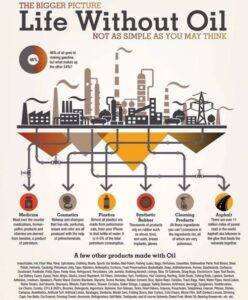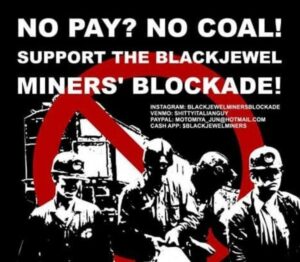The Trans in “Just Transition”
 Nicholas Reich is a 2022-23 “Mending and Transforming” Graduate Student Fellow.
Nicholas Reich is a 2022-23 “Mending and Transforming” Graduate Student Fellow.
How to “transition” to a world that isn’t fuel dependent? Maybe this was always a utopic question. Fuel scholar Heidi C. M. Scott explains, “We can’t even see oil because we look through oil glasses…we are, ourselves, petroleum products.” Toothbrushes, lip balms, sex toys, the freshness seal on that jar of organic coconut oil, my dog’s chew toys; these are petroleum derivatives. Fuel administrators have relied on this status quo for a long time, justifying their heinous means to the end of our all-pervasive fossil fuel dependency. Difficult though it is to admit, they’re not wrong about us. We’re dependent. And yet, this argument doesn’t actually go far enough. Our thoughts, desires, and behaviors are inculcated, as well. How is your gender, for instance, fossil fueled?
We perform fossil fuel dependency in ways that are similar to how we perform gender—not voluntarily, but as a mandatory negotiation with established patterns. My writing is in large part dedicated to showing how contemporary arrangements of racialized gender and sexuality are mutually constituted with fuel dependency. From this perspective, I’m not really sure we have the option to transition, whatever that might mean, to a world beyond fossil fuels, since we carry them with us. I’m curious how trans theory, then, can function as a tool for a just transition. Trans theory and activism don’t solicit the end of gender; rather, they search for ways of understanding and experiencing gender that are more livable. Yet, it feels quite illicit to think about performances of transition that don’t foreclose, that may even support extraction in surprising ways.
Late July 2019, a group of miners in Harlan County, Kentucky (#bloodyharlan), blocked a shipment of coal worth over $1 million. Blackjewel, the company responsible for the coal, filed bankruptcy earlier that month, asking miners to stop their work immediately. After cleaning out the company coffers and transferring those funds to personal accounts, the company issued final paychecks that bounced hard and fast—over $12 million dollars, to be exact.  Employees retaliated by blocking the last coal shipment. And here’s where things get really interesting: a regional group of trans anarchists, organizing under the sign #blackjewelminersblockade, came to offer aid. They helped the miners build an encampment. They fund-raised via social media. William H. Turner, a patriarch of Black Appalachian scholarship, joined them on the rail lines. A strange and unpredictable coalition was born. Affrilachian poet Crystal Good wrote in response, “Labor history then and now is made by all of America.” It’s important to keep in mind that this wasn’t an environmentalist protest. If anything, this gathering sought to keep the mine alive. How do we account for such a queer conglomerate?
Employees retaliated by blocking the last coal shipment. And here’s where things get really interesting: a regional group of trans anarchists, organizing under the sign #blackjewelminersblockade, came to offer aid. They helped the miners build an encampment. They fund-raised via social media. William H. Turner, a patriarch of Black Appalachian scholarship, joined them on the rail lines. A strange and unpredictable coalition was born. Affrilachian poet Crystal Good wrote in response, “Labor history then and now is made by all of America.” It’s important to keep in mind that this wasn’t an environmentalist protest. If anything, this gathering sought to keep the mine alive. How do we account for such a queer conglomerate?
This event is a key text for my dissertation project. Rather than treating coal as a deodand for climate catastrophe, I point out that it is precisely coal that has brought these wayward forces to bear, attracting certain forms of belonging in the Mountain South that resist the racializing, gendering confines of industry. In other words, I focus not on the deleterious effects of coal itself, but how this fuel has been deployed deleteriously by rich white hands to stabilize economically useful and racialized formations of gender and sexuality—this, and how some people break such rules. I’m working slightly against the grain of traditional environmentalism by pointing out that more deeply understanding, rather than demonizing, coal extraction is an important step toward transforming and mending the otherwise deadly effects fossil fuel dependency has wrought on all kinds of communities, inside and outside Appalachia.
The just transition, as I see it, needs to be as much about understanding how fossil fuels build up our lives as it is mitigating our fuel dependency. So far, this has mostly been a question of economics. However, if we can accept that climate change is in large part driven by a white, masculine, fossil-fueled thrust at power, then we might also accept that its mitigation can only be imagined by an approach that takes seriously the mutual constitutivity of gender, sex, race, and fuel. Doing so will prepare a more just approach to transition, demonstrating that transition is not always so clean as moving beyond, or leaving behind.
Nick Reich (he/they) studies how racialized gender and sexuality undergird energy infrastructure, as represented in regional literature and media. Check out their latest article in the Transgender Studies Quarterly: “Truck Sluts, Petrosexual Countrysides, and Trashy Environmentalism.”